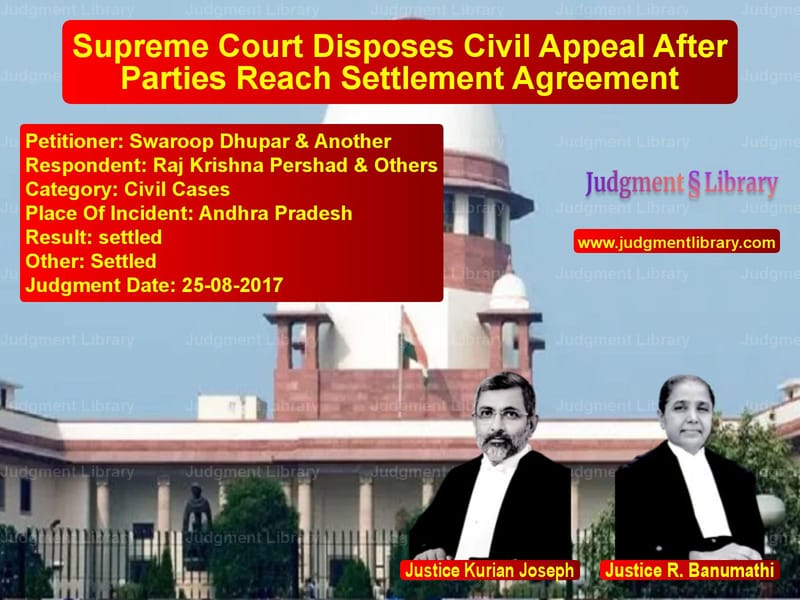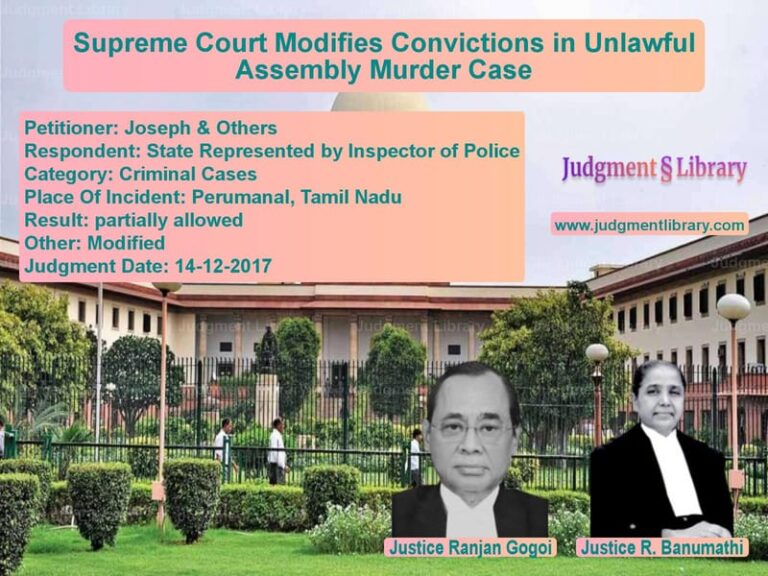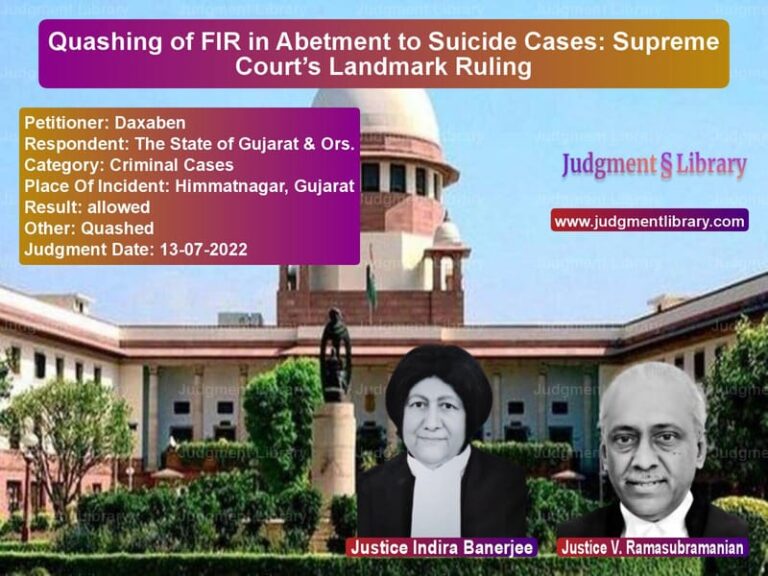Supreme Court Disposes Civil Appeal After Parties Reach Settlement Agreement
The case of Swaroop Dhupar & Another v. Raj Krishna Pershad & Others revolved around a property dispute that had been litigated for several years. The Supreme Court was approached after the appellants challenged an order passed by the Andhra Pradesh High Court. However, during the pendency of the matter before the Supreme Court, the parties arrived at a settlement, leading to the disposal of the appeal.
Background of the Case
The appellants, Swaroop Dhupar and another, had filed a Civil Revision Petition (CRP) before the Andhra Pradesh High Court at Hyderabad in CRP No. 5045 of 2011, seeking relief in a property dispute. The High Court passed its final order on April 12, 2012, which the appellants found to be unfavorable, leading them to approach the Supreme Court through Special Leave Petition (SLP) No. 18618 of 2012.
During the proceedings in the Supreme Court, the parties engaged in negotiations and reached an amicable settlement. A formal Settlement Agreement dated October 18, 2016, was signed by all concerned parties and presented to the Court as a resolution to the dispute.
Key Legal Issues
- Whether the settlement agreement reached between the parties was legally binding.
- Whether the Supreme Court needed to adjudicate on the merits of the appeal after the settlement.
- Whether the parties would be required to adhere strictly to the terms of the settlement.
Arguments by the Parties
Petitioners’ Arguments (Swaroop Dhupar & Another)
The petitioners contended that:
- The order passed by the High Court was erroneous and required intervention by the Supreme Court.
- The legal dispute had been pending for several years, and a resolution was necessary to prevent further delays and legal expenses.
- The settlement agreement was a fair and just resolution, and its terms should be recorded and enforced by the Court.
Respondents’ Arguments (Raj Krishna Pershad & Others)
The respondents argued that:
- They had mutually agreed to settle the dispute and were willing to abide by the terms of the settlement agreement.
- Since the parties had resolved their issues amicably, the appeal before the Supreme Court had become infructuous.
- The settlement should be formally recognized by the Court to avoid any future conflicts over the same matter.
Supreme Court’s Judgment
The Supreme Court, comprising Justices Kurian Joseph and R. Banumathi, acknowledged the settlement reached by the parties and disposed of the appeal accordingly.
“The parties have arrived at a settlement. They also have filed duly signed Settlement Agreement dated 18.10.2016, which is already on record. Therefore, this appeal is disposed of in terms of the Settlement Agreement, which shall form part of this Judgment.”
The Court emphasized that:
- The parties must strictly adhere to the terms of the settlement agreement.
- Since the matter had been amicably resolved, there was no need for further adjudication.
- All pending interlocutory applications related to the case were also disposed of.
Key Legal Observations
- Settlement agreements in civil disputes are legally binding when signed by all parties and accepted by the Court.
- The Supreme Court encourages amicable dispute resolution to reduce the burden on the judiciary and facilitate efficient legal proceedings.
- Once a settlement is recorded in a judicial order, it becomes enforceable, and all parties are required to comply with its terms.
Final Order
The Supreme Court:
- Disposed of the appeal in terms of the Settlement Agreement dated October 18, 2016.
- Instructed all parties to abide strictly by the terms of the settlement.
- Declared that all pending interlocutory applications were also disposed of.
Conclusion
This judgment reinforces the importance of alternative dispute resolution in civil litigation. By allowing the parties to settle their dispute amicably, the Supreme Court demonstrated the value of judicial efficiency and mutual compromise. The ruling highlights that settlements, when duly recorded and agreed upon by all parties, provide a final and binding resolution, eliminating the need for prolonged litigation.
Don’t miss out on the full details! Download the complete judgment in PDF format below and gain valuable insights instantly!
Download Judgment: Swaroop Dhupar & Ano vs Raj Krishna Pershad Supreme Court of India Judgment Dated 25-08-2017.pdf
Direct Downlaod Judgment: Direct downlaod this Judgment
See all petitions in Property Disputes
See all petitions in Contract Disputes
See all petitions in Other Cases
See all petitions in Judgment by Kurian Joseph
See all petitions in Judgment by R. Banumathi
See all petitions in settled
See all petitions in settled
See all petitions in supreme court of India judgments August 2017
See all petitions in 2017 judgments
See all posts in Civil Cases Category
See all allowed petitions in Civil Cases Category
See all Dismissed petitions in Civil Cases Category
See all partially allowed petitions in Civil Cases Category







